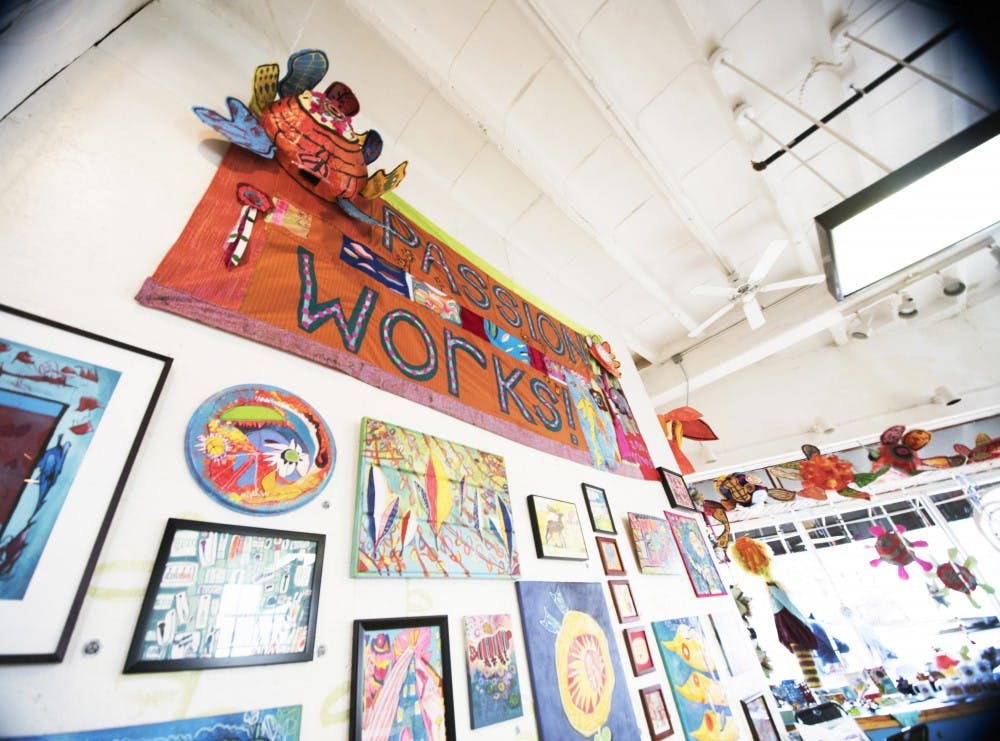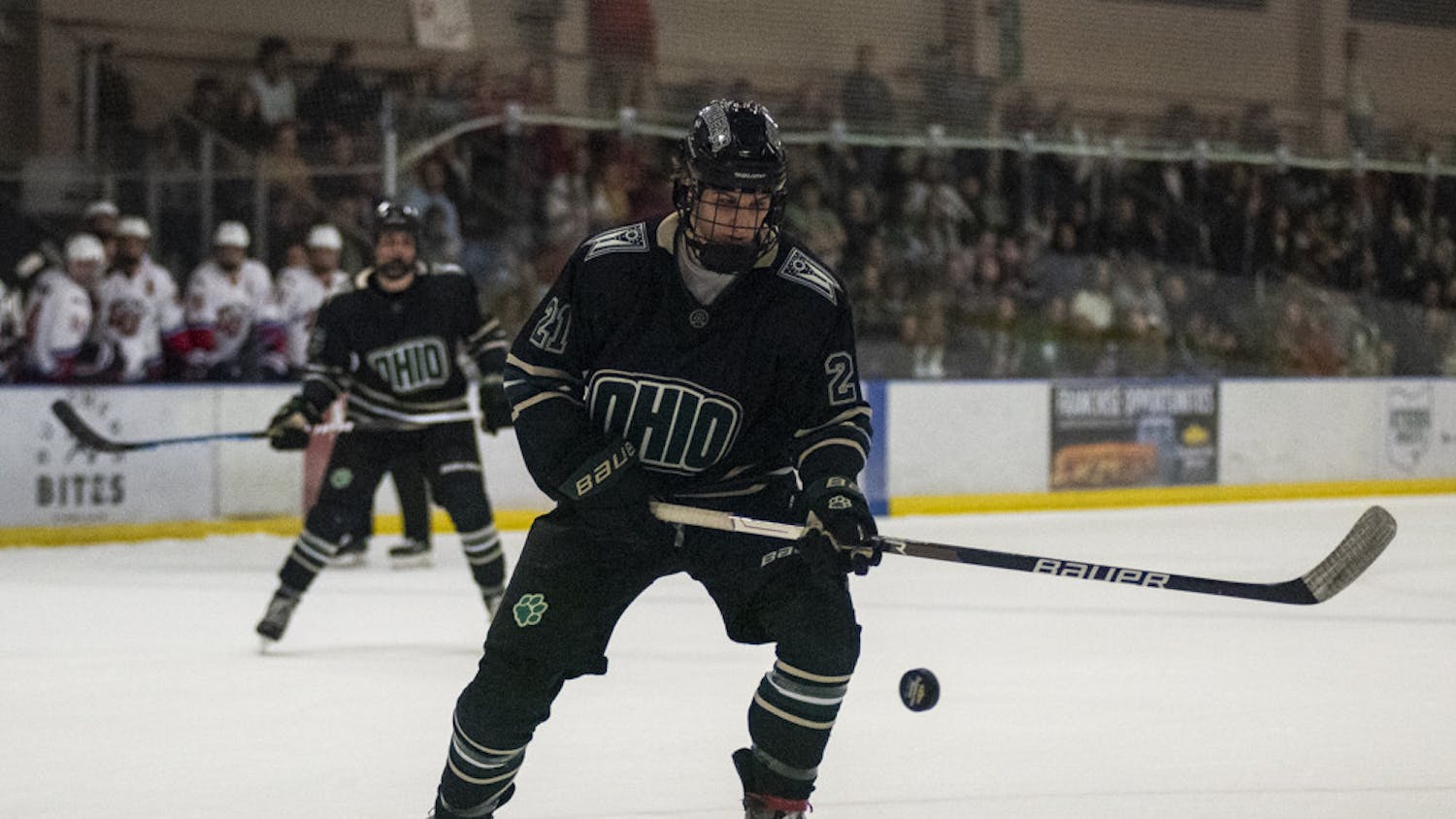A nationwide shortage of mass-produced face masks has driven many, including members of Passion Works Studio, to take matters into their own hands.
The creation of handmade face masks is now an essential part of protecting communities across the nation and effectively fighting the rapidly spreading coronavirus. Individuals at Passion Works Studio are utilizing their sewing skills to craft face masks that are primarily being donated to healthcare workers on the frontlines, nursing homes and the Athens County Board of Developmental Disabilities.
While the studio’s doors at 20 E. State St. may be locked due to a state-wide order to close all nonessential businesses, Passion Works is still very much alive, with volunteers working from home to produce thousands of masks. Patty Mitchell, founder and executive of Passion Works Studio, said mask-makers are split into groups, each group making masks for different organizations in Athens.
“There’s a medical-grade mask-making effort for the emergency workers as well as the hospital workers, and then there are cloth masks for care providers and people going to the grocery store,” Mitchell said. “So we’re doing two different kinds of masks. We’ve been in contact with our local health department, making sure our masks are the best that they can be with what we know right now. And we’re working with our community. They’re donating to our fundraisers and donating materials.”
Over the course of four weeks, Mitchell’s team has made approximately 1,200 to 1,500 masks, working closely with Ohio University’s CoLab and volunteers. Mitchell said one of the most difficult parts of the mask-making process is finding the materials.
“It’s not like we can just go to the store and buy what we need,” Mitchell said. “It’s suggested that we put a piece of metal above where the nose is in the mask, so we were using paper clips. Now we’re using twisty ties. Kroger donated thousands of them. And you can’t buy elastic anymore, so we’ve been using cut T-shirts and hair ties, trying to experiment with what we have to make something functional. It’s not just about production. It’s about scrambling for materials and then trying to figure out how to make it work.”
Teaching volunteers how to make the masks is another difficult part of the process. People can’t see each other in person, instead depending on FaceTime or texting pictures back and forth. Mitchell highlighted this, saying they are relearning how to communicate with each other.
Outside of mask-making, not all of Passion Works’ operations have ceased. Once the staff has used up the donation from Hocking Valley Bank, they still need to maintain a steady income to not only fund purchasing mask materials, but also to pay employees. Its popular passion flowers, which are flower sculptures traditionally gifted to OU graduates, are still for sale in an attempt to keep Passion Works up and running.
“There are hidden expenses that you just can’t imagine,” Mitchell said. “It seems like it should just be able to happen, but every turn is an expense, and people still have to make a living. We’re balancing donations with our expenses to make a product that we don’t know how to make with materials we don’t really have. I believe that the demand (for masks) is exponential to what I can even acknowledge. People are asking me for masks, and it’s breaking my heart.”
Tina Kelsey, a local artist who works Passion Works’ special events, is one of many volunteering their time to build the masks from home. She has made approximately 250 masks over two-and-a-half weeks. For Kelsey, it takes about five hours to make around 36 masks. Kelsey said all of it is done remotely she picks up fabric from Mitchell’s porch, goes home, makes the masks and then returns to drop the face masks off on the porch again.
“We understand that it’s not going to stop the virus, but it helps,” Kelsey said. “It’s better than nothing, and I think at some point we’re going to be required to wear the masks. I love that people in their houses are behind their sewing machines helping put an end to it. We’re all working together at a very grassroots level and making it happen.”
Melissa Haviland, an OU printmaking and drawing professor, is also working with Passion Works, aiding in the planning, creation and distribution of the face masks. Haviland’s volunteer team of eight students and two community members are specifically working to sew 1,000 masks for employees of Appalachian Behavioral Healthcare, or ABH. Haviland is also making an additional 100 for small businesses, friends and family members.
While the sewing process is easy, Haviland said most people are probably going to be unable to make the face masks simply because they won’t have access to the necessary materials. Instead of using elastic, which is nearly impossible to find anywhere for purchase, Haviland has been cutting fabric into strips to tie behind the head.
“It makes me mad at the government,” Haviland said. “These fabric masks aren’t as good as the ones (manufactured) ... I just wish that the right thing was available to the people working. I wish they were able to get them the real thing. To some extent, ABH is going to put a filter into the ones we’re providing them, but not everybody can. It’s sad. I think it’s very great that people are (making the masks), but in some ways, it’s hard.”
Once Passion Works Studio gets ahead of the curve, meets its goal and obtains more materials, it plans on making masks available for purchase to the general public.
Face mask outlines and a link to donate are available on the Passion Works Studio Facebook page.






